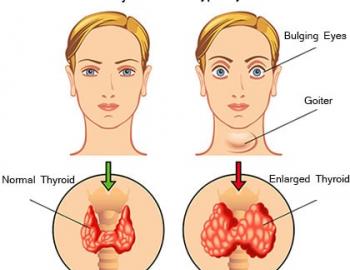Hyperthyroidism (overactive thyroid) occurs when your thyroid gland produces too much of the hormone thyroxine. Hyperthyroidism can accelerate your body's metabolism, causing unintentional weight loss and a rapid or irregular heartbeat.
Several treatments are available for hyperthyroidism. Doctors use anti-thyroid medications and radioactive iodine to slow the production of thyroid hormones. Sometimes, hyperthyroidism treatment involves surgery to remove all or part of your thyroid gland.
Although hyperthyroidism can be serious if you ignore it, most people respond well once hyperthyroidism is diagnosed and treated.
Symptoms
Hyperthyroidism can mimic other health problems, which can make it difficult for your doctor to diagnose. It can also cause a wide variety of signs and symptoms, including:
- Unintentional weight loss, even when your appetite and food intake stay the same or increase
- Rapid heartbeat (tachycardia) — commonly more than 100 beats a minute
- Irregular heartbeat (arrhythmia)
- Pounding of your heart (palpitations)
- Increased appetite
- Nervousness, anxiety and irritability
- Tremor — usually a fine trembling in your hands and fingers
- Sweating
- Changes in menstrual patterns
- Increased sensitivity to heat
- Changes in bowel patterns, especially more frequent bowel movements
- An enlarged thyroid gland (goiter), which may appear as a swelling at the base of your neck
- Fatigue, muscle weakness
- Difficulty sleeping
- Skin thinning
- Fine, brittle hair
-
Older adults are more likely to have either no signs or symptoms or subtle ones, such as an increased heart rate, heat intolerance and a tendency to become tired during ordinary activities.
Causes
Hyperthyroidism can be caused by a number of conditions, including Graves' disease, Plummer's disease and thyroiditis.
Your thyroid is a small, butterfly-shaped gland at the base of your neck, just below your Adam's apple. The thyroid gland has an enormous impact on your health. Every aspect of your metabolism is regulated by thyroid hormones.
Your thyroid gland produces two main hormones, thyroxine (T4) and triiodothyronine (T3), that influence every cell in your body. They maintain the rate at which your body uses fats and carbohydrates, help control your body temperature, influence your heart rate, and help regulate the production of protein. Your thyroid also produces a hormone that helps regulate the amount of calcium in your blood (calcitonin).
Reasons for too much thyroxine (T4)
Normally, your thyroid releases the right amount of hormones, but sometimes it produces too much T4. This may occur for a number of reasons, including:
- Graves' disease. Graves' disease is an autoimmune disorder in which antibodies produced by your immune system stimulate your thyroid to produce too much T4. It's the most common cause of hyperthyroidism.
- Hyperfunctioning thyroid nodules (toxic adenoma, toxic multinodular goiter or Plummer's disease). This form of hyperthyroidism occurs when one or more adenomas of your thyroid produce too much T4. An adenoma is a part of the gland that has walled itself off from the rest of the gland, forming noncancerous (benign) lumps that may cause an enlargement of the thyroid.
- Thyroiditis. Sometimes your thyroid gland can become inflamed after pregnancy, due to an autoimmune condition or for unknown reasons. The inflammation can cause excess thyroid hormone stored in the gland to leak into your bloodstream. Some types of thyroiditis may cause pain, while others are painless.
Risk factors:
Risk factors for hyperthyroidism, include:
- A family history, particularly of Graves' disease
- Female sex
- A personal history of certain chronic illnesses, such as type 1 diabetes, pernicious anemia and primary adrenal insufficiency
Diagnosis
Hyperthyroidism is diagnosed using:
- Medical history and physical exam. During the exam your doctor may try to detect a slight tremor in your fingers when they're extended, overactive reflexes, eye changes and warm, moist skin. Your doctor will also examine your thyroid gland as you swallow to see if it's enlarged, bumpy or tender and check your pulse to see if it's rapid or irregular.
- Blood tests. Blood tests that measure thyroxine and thyroid-stimulating hormone (TSH) can confirm the diagnosis. High levels of thyroxine and low or nonexistent amounts of TSH indicate an overactive thyroid. The amount of TSH is important because it's the hormone that signals your thyroid gland to produce more thyroxine.
- These tests are particularly necessary for older adults, who may not have classic symptoms of hyperthyroidism.
- Thyroid blood tests may give false results if you're taking biotin — a B vitamin supplement that may also be found in multivitamins. Let your doctor know if you are using biotin or a multivitamin with biotin. To ensure an accurate test, stop taking biotin at least 12 hours before blood is taken.
If blood tests indicate hyperthyroidism, your doctor may recommend one of the following tests to help determine why your thyroid is overactive:
- Radioiodine uptake test. For this test, you take a small, oral dose of radioactive iodine (radioiodine) to see how much will collect in your thyroid gland. You'll be checked after four, six or 24 hours — and sometimes after all three time periods — to see how much iodine your thyroid has absorbed.
A high uptake of radioiodine indicates your thyroid gland is producing too much thyroxine. The most likely cause is either Graves' disease or hyperfunctioning thyroid nodules. If you have hyperthyroidism and your radioiodine uptake is low, this indicates that the thyroxine stored in the gland is leaking into the bloodstream, which may mean you have thyroiditis.
- Thyroid scan. During this test, you'll have a radioactive isotope injected into the vein on the inside of your elbow or sometimes into a vein in your hand. You then lie on a table with your head stretched backward while a special camera produces an image of your thyroid gland on a computer screen. This test shows how iodine collects in your thyroid.
- Thyroid ultrasound. This test uses high-frequency sound waves to produce images of the thyroid. Ultrasound may be better at detecting thyroid nodules than other tests, and there's no exposure to any radiation.
Treatment
Several treatments for hyperthyroidism exist. The best approach for you depends on your age, physical condition, the underlying cause of the hyperthyroidism, personal preference and the severity of your disorder. Possible treatments include:
- Radioactive iodine. Taken by mouth, radioactive iodine is absorbed by your thyroid gland, where it causes the gland to shrink. Symptoms usually subside within several months. Excess radioactive iodine disappears from the body in weeks to months.
This treatment may cause thyroid activity to slow enough to be considered underactive (hypothyroidism), and you may eventually need to take medication every day to replace thyroxine.
- Anti-thyroid medications. These medications gradually reduce symptoms of hyperthyroidism by preventing your thyroid gland from producing excess amounts of hormones. They include methimazole (Tapazole) and propylithiouracil. Symptoms usually begin to improve within several weeks to months, but treatment with anti-thyroid medications typically continues at least a year and often longer.
For some people, this clears up the problem permanently, but other people may experience a relapse. Both drugs can cause serious liver damage, sometimes leading to death. Because propylthiouracil has caused far more cases of liver damage, it generally should be used only when you can't tolerate methimazole.
A small number of people who are allergic to these drugs may develop skin rashes, hives, fever or joint pain. They also can make you more susceptible to infection.
- Beta blockers. Although these drugs are usually used to treat high blood pressure and don't affect thyroid levels, they can ease symptoms of hyperthyroidism, such as a tremor, rapid heart rate and palpitations. For that reason, your doctor may prescribe them to help you feel better until your thyroid levels are closer to normal. These medications generally aren't recommended for people who have asthma, and side effects may include fatigue and sexual dysfunction.
- Surgery (thyroidectomy). If you're pregnant or you otherwise can't tolerate anti-thyroid drugs and don't want to or can't have radioactive iodine therapy, you may be a candidate for thyroid surgery, although this is an option in only a few cases.
In a thyroidectomy, your doctor removes most of your thyroid gland. Risks of this surgery include damage to your vocal cords and parathyroid glands — four tiny glands situated on the back of your thyroid gland that help control the level of calcium in your blood.
In addition, you'll need lifelong treatment with levothyroxine (Levoxyl, Synthroid, others) to supply your body with normal amounts of thyroid hormone. If your parathyroid glands also are removed, you'll need medication to keep your blood-calcium levels normal.










